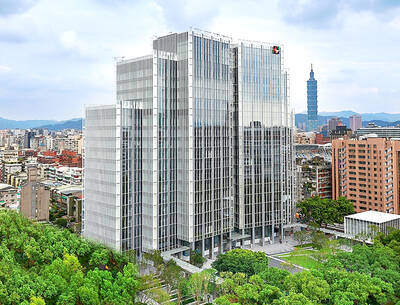The share price of Far Eastern Department Store Ltd (
The stock also obtained support from a regulatory approval from the Fair Trade Commission yesterday which allows it to merge with Pacific Sogo Department Store Co (太平洋崇光百貨), the nation's second-largest department store chain.
Shares of Far Eastern, the nation's third-largest department store operator, yesterday gained NT$2.6, or 6.93 percent, to close at NT$40.1, a record high, Taiwan Stock Exchange data show.
The stock has risen by 10.02 percent since Thursday after Far Eastern announced plans to spend US$79.5 million on 7.6 million shares, or 40 percent, in Pacific China Holdings Ltd (太平洋中國控股).
In a filing sent to the stock exchange on Thursday, Far Eastern said the share purchase would enable it to own a stake of around 67.5 percent in Pacific China Holdings, which operates a chain of nine department stores in China.
Analysts said that with Sogo's strong brand image and firm customer loyalty, the share purchase would increase upside momentum for Far Eastern through next year.
"Far Eastern could acknowledge its earnings from the first quarter of next year" from its increased stake in Pacific China Holdings, Vincent Chen, an analyst at SinoPac Securities Co (
"We project sustainable recurring earnings growth for Far Eastern with recurring EPS [earnings per share] of NT$0.89 in 2007 and NT$1.15 in 2008, implying 53.5 percent and 28.5 percent year-on-year growth," he wrote.
SinoPac reiterated its "outperform" rating on Far Eastern, with a target price of NT$46.6 on the back of expectations of business turnaround at its Geant hypermarket operation in Taiwan and the anticipated growth potential of Pacific stores in China.
Merrill Lynch & Co was also optimistic about Far Eastern's business outlook. It yesterday raised the stock's target price to NT$48 from NT$36, with earnings per share of NT$1.47 for this year and NT$1.78 for next year, up 21 percent and 36 percent year-on-year, respectively.
In Taiwan, the regulatory approval will allow Far Eastern and Pacific Sogo to enjoy a collective market share of 23.08 percent, widening the gap between them and their domestic rivals even further.
The commission said the combination was not expected to hurt domestic market competition.
In 2002, Far Eastern Department spent around NT$1 billion to acquire a 43.56 percent stake in Pacific Sogo.

UNCERTAINTY: Investors remain worried that trade negotiations with Washington could go poorly, given Trump’s inconsistency on tariffs in his second term, experts said The consumer confidence index this month fell for a ninth consecutive month to its lowest level in 13 months, as global trade uncertainties and tariff risks cloud Taiwan’s economic outlook, a survey released yesterday by National Central University found. The biggest decline came from the timing for stock investments, which plunged 11.82 points to 26.82, underscoring bleak investor confidence, it said. “Although the TAIEX reclaimed the 21,000-point mark after the US and China agreed to bury the hatchet for 90 days, investors remain worried that the situation would turn sour later,” said Dachrahn Wu (吳大任), director of the university’s Research Center for

Alchip Technologies Ltd (世芯), an application-specific integrated circuit (ASIC) designer specializing in artificial-intelligence (AI) chips, yesterday said that small-volume production of 3-nanometer (nm) chips for a key customer is on track to start by the end of this year, dismissing speculation about delays in producing advanced chips. As Alchip is transitioning from 7-nanometer and 5-nanometer process technology to 3 nanometers, investors and shareholders have been closely monitoring whether the company is navigating through such transition smoothly. “We are proceeding well in [building] this generation [of chips]. It appears to me that no revision will be required. We have achieved success in designing

PROJECTION: KGI Financial said that based on its foreign exchange exposure, a NT$0.1 increase in the New Taiwan dollar would negatively impact it by about NT$1.7 billion KGI Financial Holding Co (凱基金控) yesterday said its life insurance arm has increased hedging and adopted other moves to curb the impact of the local currency’s appreciation on its profitability. “It is difficult to accurately depict the hedging costs, which might vary from 7 percent to 40 percent in a single day,” KGI Life Insurance Co (凱基人壽) told an investors’ conference in Taipei. KGI Life, which underpinned 66 percent of the group’s total net income last year, has elevated hedging to 55 to 60 percent, while using a basket of currencies to manage currency volatility, the insurer said. As different

Taiwanese insurers are facing difficult questions about the damage of recent swings in the New Taiwan dollar. Regulators might have a partial solution: letting firms change how they calculate the value of foreign currency assets. The Financial Supervisory Commission (FSC) is considering allowing insurers to use six-month average exchange rates when they calculate risk-based capital in their semiannual reports, a shift from the current system where insurers use exchange rates on the final day of reporting. The change could ease pressure on the US$1.2 trillion insurance sector, whose huge exposure to foreign assets came into the spotlight earlier this month after a